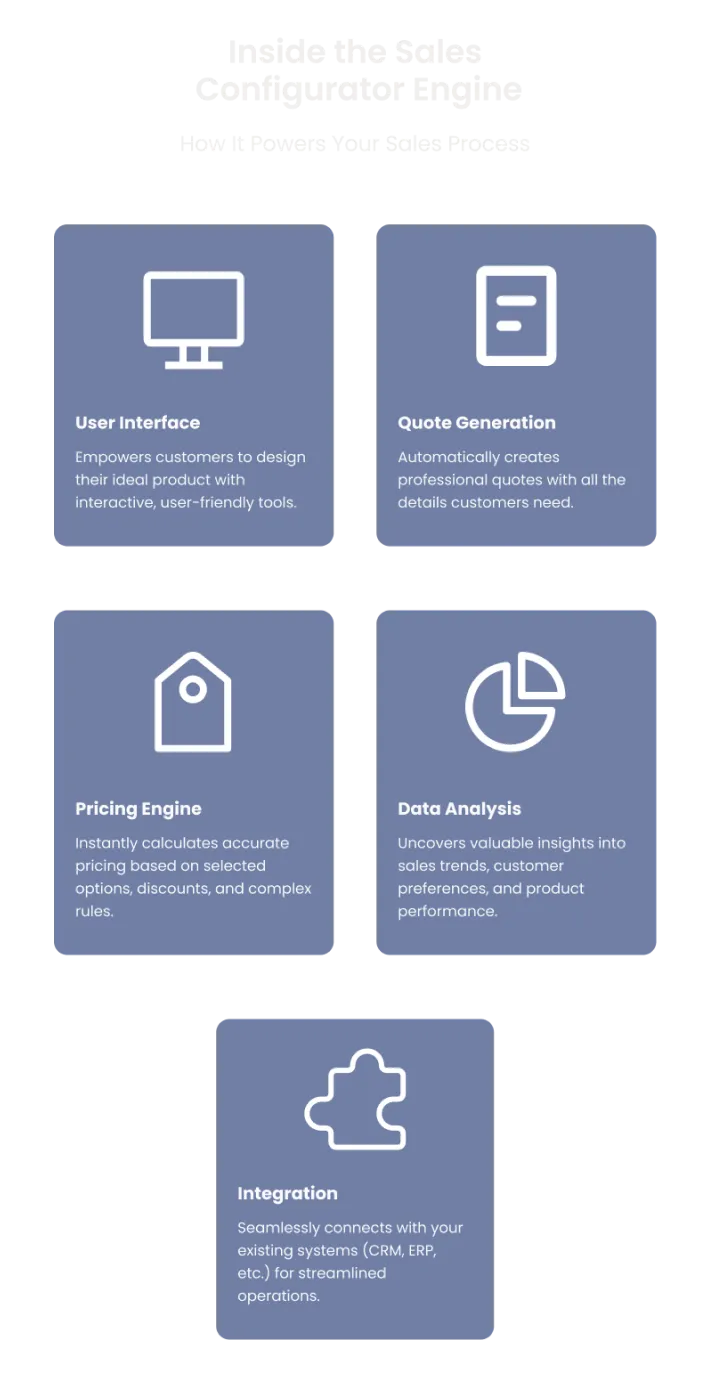What is a Sales Configurator?
Sales Configurator Explained
Sales Configurators streamline the process where businesses sell customizable products.
How It Works:
The software helps sales teams generate quotes for products with various configuration options. It manages complex pricing structures and business rules to ensure accurate quotes tailored to customer needs.
Core Features and Capabilities:
- Product Configurator: An interactive platform for users to choose and customize products or services per customer requirements.
- Pricing Engine: Advanced algorithms that handle intricate pricing structures, like discounts, bundles, and seasonal rates.
- Quote Generation: Automated tools for generating detailed and customized sales quotes, proposals, or contracts.
- Data Analysis: Insightful data analysis on quoting trends, sales performance, and customer preferences, aiding strategic decisions.
- Integration: Smooth connections with CRM, ERP, and other business systems for comprehensive data coherence and operational alignment.
This extensive functionality enables businesses to quickly and accurately address customer inquiries, minimize manual errors, and ensure consistency in sales operations.

Companies using product configurators experience:
- A 66% higher conversion rate compared to those using 2D solutions.
- A 40% increase in conversion rates when utilizing interactive 3D configurators.
- An 82% engagement rate from visitors who activate 3D views on product pages.
This efficiency boost allows sales teams to focus more on customer interactions and closing deals. The improved accuracy and speed of the quoting process reduce delays and errors, leading to faster deal closures and enhanced customer satisfaction. Sales configurators also offer features like augmented reality, allowing customers to visualize items in their own space, which leads to a 40% higher likelihood of purchase.
Benefits of Implementing a Sales Configurator
Implementing a Sales Configurator yields significant benefits across various departments within a company. Here are two examples:
- For Sales Teams: Sales Configurators provide representatives with the tools to swiftly create precise, customized proposals. This empowers them to respond to customer queries more quickly and accurately, leading to increased sales and improved customer satisfaction.
- For Operations and Efficiency: Sales Configurators optimize operational efficiency by automating the quote-to-cash process, reducing manual entry, and minimizing errors. This streamlined process results in more reliable data, improved forecasting, and ultimately, more efficient operational management throughout the organization.
Automate sales process with dynamic quoting and pricing
Ensure error free order handling and production
Scale your business into new markets
Industry-specific Applications
Sales Configurators aren't one-size-fits-all. They adapt to diverse industries, enhancing their unique sales processes.
- In the automotive industry, Sales Configurators can handle the various configurations of vehicles, allowing customers to personalize their cars by choosing features like the engine, color, and interior, ensuring all selections are compatible and priced accurately.
- In sectors such as office space and layout planning, Sales Configurators can aid in designing spaces, integrating various furniture and fixture choices into layouts while offering real-time pricing updates as decisions are made.
- In industries like machinery or shipbuilding, Sales Configurators can manage complex assemblies and components, calculating costs for custom engineering, materials, and labor, streamlining the proposal process for large-scale projects with many variables.
Do you need a product configurator?
We empower manufacturers to master product modeling, streamline quoting process, reduce errors, and ultimately deliver the tailored solutions that customers demand.
Integrating Sales Configurators with Existing Systems
Integrating Sales Configurators with existing systems like CRM, ERP, and CAD transforms the sales process into a seamless operation. This integration allows for real-time data synchronization across platforms, ensuring that any changes in customer data or inventory levels are updated instantly to ensure quote accuracy.
Workflow automation is a key benefit, enabling Sales Configurators to trigger CRM follow-up actions or initiate manufacturing in an ERP once a quote is accepted. This expedites the entire sales cycle and ensures that departments from sales to production work with the same accurate data, reducing errors and enhancing efficiency.

- CRM Integration: Integrating Sales Configurators with CRM systems aligns sales data with customer information, enabling sales teams to create personalized quotes based on customer interactions and history. This integration ensures that all communications and quotes are tracked and managed from a central location.
- ERP Integration: Connecting Sales Configurators to ERP systems allows for a streamlined flow from sales quotes to order fulfillment. This ensures that inventory, supply chain data, and financial information are all reflected in customer quotes, maintaining consistency across business operations.
- CAD Integration: For industries reliant on detailed designs, such as manufacturing, integrating Sales Configurators with CAD systems allows for the automatic generation of quotes based on precise engineering specifications. This ensures that products meet exact requirements and that pricing reflects the design complexity.
- Data Synchronization: Data synchronization ensures information across CRM, ERP, and CAD systems is consistent and up to date. When a sales rep provides a quote, the Sales Configurator automatically retrieves the latest data, so quotes are always based on the most current information.
- Workflow Automation: Workflow automation with Sales Configurators reduces manual tasks by automating steps like quote approvals and initiating production orders once a quote is accepted. This expedites the sales cycle, reduces human error potential, and allows departments like sales, finance, and production to work more cohesively.
Advanced Sales Configurator Features
Advanced Sales Configurator features enhance standard configure, price, quote functionalities, introducing sophisticated tools for complex sales environments.
- Quote Approvals and Workflow Management:
This feature streamlines the process of getting quotes reviewed and approved by necessary personnel. By setting predefined rules and approval hierarchies, Sales Configurators ensure quotes are accurate and adhere to business standards before reaching customers. Automated workflows notify approvers, reducing delays and improving efficiency. - Compliance and Governance:
Sales Configurator software adheres to industry standards and regulations, ensuring that all quotes and sales activities comply with legal requirements. This includes securely managing data and consistently applying pricing and discounting rules to avoid compliance risks. By automating these aspects, Sales Configurators help businesses maintain governance standards effortlessly.
Choosing the Right Sales Configurator Software
When choosing the right Sales Configurator, it's crucial to align your selection with business needs and goals.
- Selection Criteria and Process:
Start by identifying your specific requirements, such as product complexity, customization needs, and integration with existing systems. Consider scalability to support growth and the software's ease of use for your team. - Vendor Evaluation and Comparison:
Research potential vendors, focusing on their software capabilities, customer support, and development roadmap. Compare costs, including initial setup and ongoing operation, against the value and efficiencies the solution provides. This approach ensures you select a Sales Configurator that fits both your current and future business needs.
Implementation and Adoption of Sales Configurators
Implementing and adopting Sales Configurator software effectively is key to maximizing its benefits.

- Best Practices for Deployment:
Begin with detailed planning. Identify your main goals, verify the accuracy of your data, and choose a phased approach for the rollout. Early engagement with all stakeholders is crucial to set expectations and gather necessary support. - Strategies for Training and User Adoption:
Tailor training programs to fit the different roles within your organization to facilitate better understanding and use of the Sales Configurator system. Provide ongoing support and establish channels for feedback to address any issues swiftly, ensuring users gain confidence and the system meets organizational needs effectively.
Future Trends
Looking ahead, Sales Configurators are set to embrace AI and machine learning more fully. These advancements will allow for even smarter configuration options, dynamic pricing, and personalized quotes, all tailored to the customer's specific needs and past behaviors. By analyzing data patterns, AI can offer predictive insights, suggesting optimizations for sales strategies and product offerings. Keep an eye on these innovations as they promise to make Sales Configurators even more powerful in boosting sales efficiency and customer satisfaction.
Let’s build together.
We empower manufacturers to master product modeling, streamline quoting process, reduce errors, and ultimately deliver the tailored solutions that customers demand.

